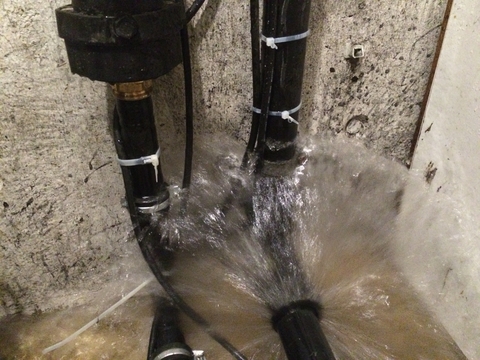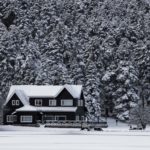
Home flooding can happen all too easily – and all too quickly. The damage from a flood can be expensive and time-consuming to repair. While proper flood insurance can help, the best solution is to avoid flooding in the first place.
Natural disasters happen, but there are a number of steps that homeowners can take to prevent flooding. Read on to learn some of the most causes of home flooding, and what you can do to prevent it.
Causes of Flooding
While most people may correlate flooding to excessive rain, or high water levels in local rivers or streams, there are a number of issues that can happen right in your home.
Leaky or Broken Pipes
Believe it or not, broken or leaking pipes are one of the most common causes of home flooding. Changes in water pressure, or a faculty set up can lead to pipe bursts. Frozen pipes are extremely prone to breaking as well.
Floods due to broken pipes can happen quickly and are often a sign of a bigger problem. Hidden floods, those that can’t be seen, pose a risk risk of mold and mildew damage within your home.
Leaking Water Heater
Water heaters are designed to constantly fill themselves in order to heat water for your home. Even a small leak can cause a huge issue, as the pipes contain an endless flow of water. There are a number of causes for a water heater leak, so be sure to contact a professional immediately to resolve the issue.
Clogged Sewer or Drain Lines
Sewage blockages can actually occur quite easily if you aren’t careful about what you rinse down the drain or flush down the toilet. While a small clog can be easily cleared and cause minimal issues, larger clogs can completely block the system and lead to water and sewage backup in your home.
Faulty Sump Pump
Sump pumps are designed to pump out excess water from the ground around your home. If they fail to do their job, your basement may flood due to excess ground water. These pumps are not immune to mechanical failure. Most rely on a power source to operate, so if the power goes out the sump pump will not work.
Poor Basement Sealing
If your basement’s seal was improperly done or has deteriorated, ground water can seep into the basement. You’ll notice a significant presence of water during times of heavy rainfall or when the snow melts during spring.
Preventing Home Floods
Luckily many of these issues are preventable! Here are a few precautions you can take to reduce the likelihood of a flood in your home.
1. Seal Cracks in the Foundation Walls and Basement Floors
Cracks in your foundation and basement floors should be sealed properly. Most sealants can be applied inside and do not require any outside digging to access the foundation.
2. Have a Backup Power Source for Your Sump Pump
In case of a power outage, you should have a backup power source for your sump pump such, as a small generator. You can purchase battery-operated sump pumps that act as backups. Alternatively, you can invest in a combination sump pump that has a battery backup already built into the unit.
Did you know that homeowners and renters with sump pumps may qualify for a discount on home insurance? Contact one of our licensed brokers to learn more!
3. Be Careful What You Flush Down the Drains
The most likely culprits when it comes to clogged drains are cooking grease, oil, and food debris. The best way to keep your sinks clear is to prevent clogs by paying attention to what you allow to drain through your home’s pipes.
Avoid the hassle of a home flood by being careful about what you flush down the drains, and be sure to deal with slow drains as soon as possible to avoid larger blockages.
4. Fix Leaks and Drips As Soon As Possible
Leaks and drips should also be addressed immediately. Small leaks or drips in the basement are likely signs of a larger issue culminating in your home’s piping.
5. Update Your Home’s Pipes (if Necessary)
If your home was built prior to the 1950s, it may use galvanized pipes. Unfortunately, this material has a notoriously short life span and is highly susceptible to corrosion. When pipes such as these fail, it leads to leaks and floods. If your home was built before the 1950s, have your pipes looked at and consider replacing them in necessary.
it’s likely the house contains galvanized pipes. This material is notorious for having a short life span and is susceptible to corrosion.
Pipes made of galvanized steel are likely to breakdown and cause leaks and floods in your home. If you have galvanized pipes, you may want to consider replacing them.
Flooding and Home Insurance
If the worst happens and your home does flood, are you covered? There are different types of coverage for flooding, some of which may already be included in your existing policy. Contact your broker to find out what type of coverage you have.
Water Damage
In the world of insurance, instances of home flooding are technically referred to as “water damage”. Most basic home insurance policies include protection against sudden and accidental water damage. That being said, insurance companies do not accept claims for damages caused due to negligence or failure to properly maintain a home. When a water damage claim is filed, insurers look at whether the damage is caused by dirty water (i.e. from the sewage system) or clean water, which can help them determine what is covered and what isn’t.
Sewer Backup Coverage
Sewer backup coverage is optional and not included in basic home insurance policies. This covers damages caused by dirty water (sewage).
Sewer backups commonly happen when there is a significant blockage in the sewer pipes or when rain or melted snow overwhelms the city sewer system.
Overland Flooding
Overland flooding is flooding caused due to nature (i.e. overflowing lakes and rivers). Most standard home insurance policies do not include this type of coverage, as not all homeowners are at significant risk of flooding. In order to determine if overland flood coverage is necessary for your home, you will need to take into account the down slope of your property and whether or not you are located in a flood zone.
Protect Your Home With Proper Coverage
No one wants any surprises when it comes to their home insurance coverage. If you have concerns or questions regarding your home and flooding, feel free to contact our professional brokers at Capital Insurance.

